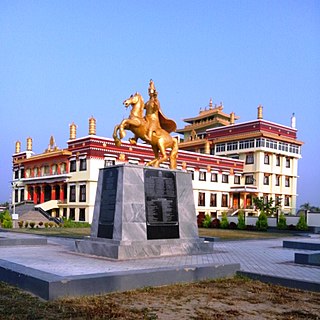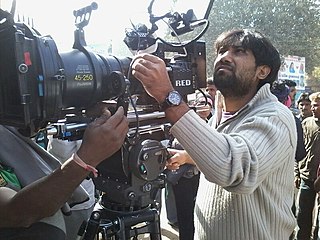
The Central Tibetan Administration is a non-profit political organization based in Dharamshala, India. Its organization is modeled after an elective parliamentary government, composed of a judiciary branch, a legislative branch, and an executive branch, and is sometimes labelled as a government in exile for Tibet.

Arunachal Pradesh is a state in northeast India. It was formed from the North-East Frontier Agency (NEFA) region, and India declared it as a state on 20 February 1987. Itanagar is its capital and largest town. It borders the Indian states of Assam and Nagaland to the south. It shares international borders with Bhutan in the west, Myanmar in the east, and a disputed 1,129 km border with China's Tibet Autonomous Region in the north at the McMahon Line.

Tibet House is an international, loosely affiliated group of nonprofit, cultural preservation organizations founded at the request of the Dalai Lama, to preserve, present, and protect Tibet's ancient traditions of philosophy, mind science, art, and culture due to the Chinese invasion of Tibet in 1950 and subsequent Tibetan diaspora. The first Tibet House was founded in New Delhi, India in 1965.

Karan Singh is an Indian politician and philosopher. He is the Maharaja of the princely state of Jammu and Kashmir. From 1952 to 1965 he was the Sadr-i-Riyasat (President) of the state of Jammu and Kashmir in the Republic of India. He is the chairperson trustee of the Dharmarth Trust of Jammu and Kashmir which maintains 175 temples in north India and works in other areas such as historical preservation.

Siddavanahalli Nijalingappa was an Indian Congress Party politician, lawyer, and Indian independence activist. He was the fourth Chief Minister of Mysore State, serving two terms. In addition to the Indian independence movement, he played an important role in the Karnataka Unification movement.

Balmiki Prasad Singh was the 14th Governor of Sikkim, India. He is a retired IAS officer and has written books and articles relating to Indian culture, in particular the culture of North-East India. Among his prominent books are Bahudha and the post 9/11 World and The problem of change: a study of North East India.

Neeraj Gupta is an Indian sculptor. He took second prize in the sculpture section of the Florence Biennale in 2017, one of over a hundred winners in eleven sections. Gupta became the first Indian artist to win Florence Biennale Award. In 2018 he was one of the two hundred artists accepted to exhibit at the annual NordArt exhibition in the Carlshütte of Büdelsdorf, in Schleswig-Holstein in northern Germany. Keshav Malik was his guru.

The 14th Dalai Lama, known to the Tibetan people as Gyalwa Rinpoche, is, as the incumbent Dalai Lama, the highest spiritual leader and head of Tibet. He is considered a living Bodhisattva; specifically, an emanation of Avalokiteśvara in Sanskrit, and Chenrezig in Tibetan. He is also the leader and a monk of the Gelug school, the newest school of Tibetan Buddhism, formally headed by the Ganden Tripa. The central government of Tibet, the Ganden Phodrang, invested the Dalai Lama with temporal duties until his exile in 1959.

The Tibetan diaspora are the diaspora of Tibetan people living outside Tibet.
The Dalai Lama Center for Peace and Education is an international charitable organization and education center located in Vancouver, British Columbia, Canada. Established in 2005, the center describes its mission as "educate the hearts of children by informing, inspiring and engaging the communities around them".
There is a small Mongolian community in India, comprising mostly Buddhist monks and scholars as well as international students from Mongolia.
Gandhi Global Family is United Nations Department of Global Communications accredited Peace NGO which propagates the ideologies of Mahatma Gandhi, Martin Luther King Jr. & Nelson Mandela among youth. It associates itself at enhancing friendship at grass root level, and establish people to people contact throughout the world.
The Aligarh Muslim University Students' Union (AMUSU) is the official Students' Union of the Aligarh Muslim University, Aligarh, India. The Aligarh Muslim University Students' Union is the university-wide representative body for students and is autonomous in nature. It works according to their own Constitution written by Amin A. Bulbuliya. It is primarily responsible for building and preserving a healthy political culture and an atmosphere of open debates on the campus. Students are kept informed about the public meetings, discussions and other issues through pamphlets and notices.

International Centre, Goa is prominent conference centre, seminars venue, and cultural space in the western Indian state of Goa. It is located at Dona Paula, outside Panjim (Panjim). Its setting up has been supported, among others, by the Ford Foundation.
Gandhi Mandela Awards is one of the most prestigious International award established by "The Gandhi Mandela Foundation" for promoting Gandhian and Nelson Mandela’s values, of community service and social development, selected by world’s biggest constitutional jury headed by Justice K. G. Balakrishnan, and includes Justice Dipak Misra, Justice Kedar Nath Upadhyay, Justice Md. Tafazzul Islam, Justice Gyan Sudha Misra.

Dev Agarwal is an Indian cinematographer and director. He is best known for his work in the films like CityLights and Bollywood Diaries. Dev directed the documentary film Moved by Love which was screened at Cannes court metrege in 2015. He was nominated for his work in the International feature film Invasion 1897 at BON awards for best cinematography. Dev shot advertising campaign for Manforce Condoms "Shut The Phone Up 3" which won two golds in the ‘Best use of Social media for CSR’ and ‘Best use of video for CSR’ categories at Foxglove advertising awards.

Lobsang Nyandak, sometimes written Lobsang Nyendak also called Lobsang Nyandak Zayul is a Tibetan diplomat and politician. born in 1965 in Kalimpong, India where he performed his studies in Herbertpur and at Panjab University in Chandigarh. There, he held functions at Tibetan Youth Congress before becoming the founding Executive Director of the Tibetan Centre for Human Rights and Democracy. Member of the National Democratic Party of Tibet, he was elected deputy and was selected as a minister by Samdhong Rinpoche, the first elected Kalon Tripa of Central Tibetan Administration (CTA). He then was the Representative of the 14th Dalai Lama to the Americas and became president of The Tibet Fund.

Tibet–India relations are said to have begun during the spread of Buddhism to Tibet from India during the 6th century AD. In 1959, the Dalai Lama fled to India after the failed 1959 Tibetan uprising. Since then, Tibetans-in-exile have been given asylum in India, with the Indian government accommodating them into 45 residential settlements across 10 states in the country. From around 150,000 Tibetan refugees in 2011, the number fell to 85,000 in 2018, according to government data. Many Tibetans are now leaving India to go back to Tibet and other countries such as United States or Germany. The Government of India, soon after India's independence in 1947, treated Tibet as a de facto independent country. However, more recently India's policy on Tibet has been mindful of Chinese sensibilities, and has recognized Tibet as a part of China.

Shanti Stupa is a Buddhist monument in Delhi, India, intended as "a symbol of universal brotherhood and peace." It is one of several Peace Pagodas in the world. Started by the Nipponzan-Myōhōji-Daisanga religious order of Buddhism, it was inaugurated by the Dalai Lama on 4 November 2007.















